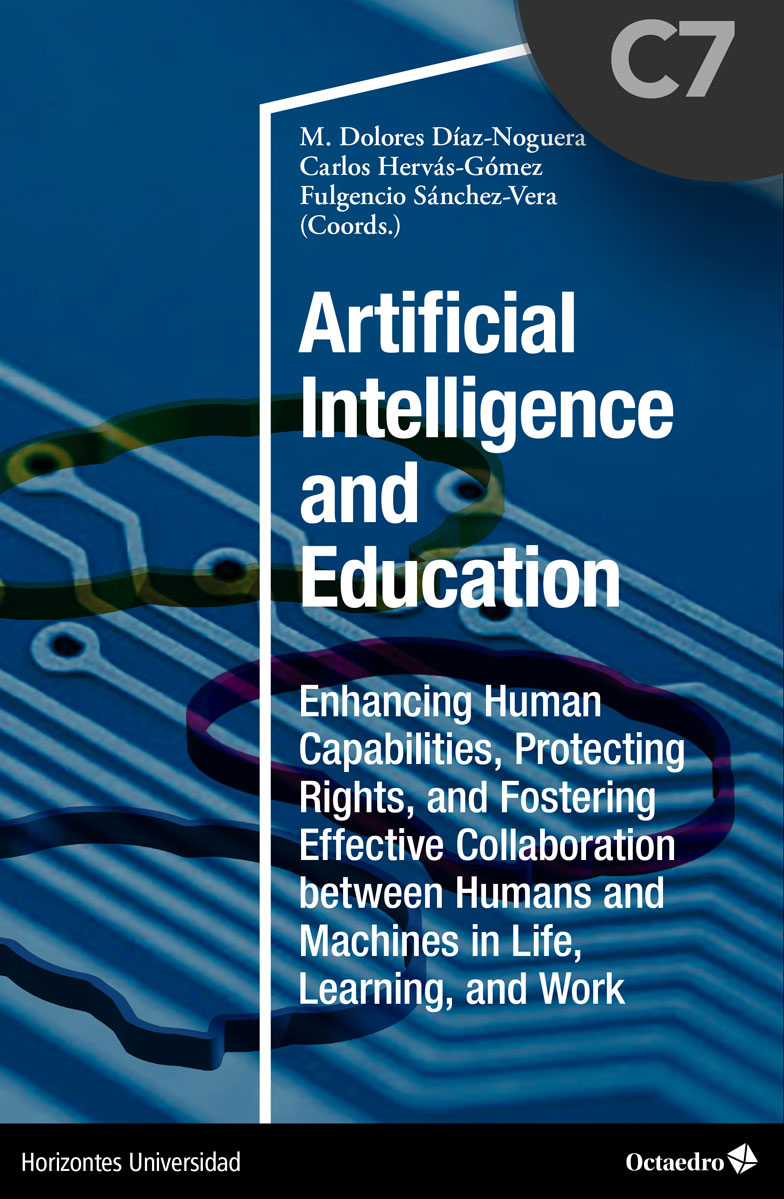FICHA TÉCNICA
Fecha de publicación:
06/11/2024
Doi del capítulo:
Título del libro: Artificial Intelligence and Education
URL del libro:
ISBN del libro: 9788410282452
DOI del libro:
Abstract
Currently, there are various artificial intelligence tools, such as natural language processors, which are used to enhance teaching and learning processes. In this context, the use of virtual assistants is becoming increasingly common in higher education institutions. This study addresses the design, implementation, and evaluation of a chatbot designed to improve inclusive learning in university students. This artificial intelligence-based system was implemented with undergraduate and postgraduate students in the field of education at Universidad Europea de Madrid. To achieve this, an exploratory and descriptive study with a mixed-methods approach was conducted. A self-perception questionnaire was used as a research instrument to evaluate usability, accuracy, interaction, utility, and satisfaction criteria, along with gathering qualitative feedback. The results revealed highly positive student evaluations of the chatbot, consistently surpassing average ratings of 4.2 out of 5. Furthermore, the correlation between satisfaction with the chatbot and other questions regarding usability, accuracy, interaction, and utility showed direct and significant correlations in all cases. In conclusion, this virtual and conversational assistant proves to be a valuable practice in future chatbot designs for enhancing inclusive learning based on Universal Design for Learning.
Palabras clave
Autores
PhD Judit Ruiz-Lázaro
Universidad Nacional de Educación a Distancia (UNED)
judit.ruiz@edu.uned.es
https://orcid.org/0000-0003-2036-0428
PhD Eva Jiménez-García
Universidad Europea de Madrid, Spain
eva.jimenez@universidadeuropea.es
https://orcid.org/0000-0001-6541-3517
PhD Sonia Martínez-Requejo
Universidad Europea de Madrid, Spain
sonia.martinez@universidadeuropea.es
https://orcid.org/0000-0001-6934-2664
PhD Sara Redondo-Duarte
Universidad Complutense de Madrid, Spain
saredo02@ucm.es
https://orcid.org/0000-0003-2012-8784
Cómo citar
Ruiz-Lázaro, J., Jiménez-García, E., Martínez-Requejo, S., Redondo-Duarte, S. (2024). Design, Implementation, and Evaluation of a Chatbot to Enhance Inclusive Learning through Universal Design for Learning in University Students. In Díaz-Noguera, M. D., Hervás-Gómez, C., Sánchez-Vera, F. (Coords.), Artificial Intelligence and Education (pp. 111-126). Octaedro. https://doi.org/10.36006/09643-1-07
Referencias bibliográficas
«Baltazar, C. (2023). Herramientas de IA aplicables a la educación. Technology Rain Journal, 2(2), e15-e15.
Benito-Sánchez, P. (2022). Hábitos en el uso de los asistentes virtuales de voz entre la población de personas con discapacidad visual. RED Visual: Revista Especializada en Discapacidad Visual, 80, 71-82. https://doi.org/10.53094/UQBX7021
Burgstahler, S. (2015). Universal Design in Higher Education: Promising Practices. DO-IT. University of Washington. https://www.washington.edu/doit/sites/default/files/atoms/files/Universal%20Design%20in%20Higher%20Education_Promising%20Practices.pdf
CAST (2018). Universal Design for Learning Guidelines, version 2.2. http://udlguidelines.cast.org
Cruz, O. D. C., Mariño, G. A., Tejada, J. B., & More, O. A. R. (2021). La usabilidad percibida de los chatbots sobre la atención al cliente en las organizaciones: una revisión de la literatura. Interfases, 14, 184-204.
Elizondo, C. (2023). Retos y oportunidades de la LOMLOE para la educación inclusiva. Dosier Graó, 8, 5.
Gauna-Ferraz, R. A., Vital Ferraz, V. M., Morosetti Ferreira, C. C., Vaz Paiva, J., & Carneiro Sarturi, R. (2024). El buen uso de las tecnologías y la inteligencia artificial en la educación: investigación y prácticas educativas. In Libro de resúmenes de trabajos a IRED’23. III Conferencia internacional de investigación y V Jornadas de investigación e innovación educativa.
Jiménez-García, E., Orenes-Martínez, N., & López-Fraile, L. A. (2024). Rueda de la pedagogía para la inteligencia artificial: adaptación de la rueda de Carrington. RIED-Revista Iberoamericana de Educación a Distancia, 27(1), 87-113. https://doi.org/10.5944/ried.27.1.37622
Kuhail, M.A., Alturki, N., Alramlawi, S. & Alhejori, K. (2023). Interacting with educational chatbots: A systematic review. Education and Information Technologies, 28, 973-1018. https://doi.org/10.1007/s10639-022-11177-3
Mateos, J. E. G. (2023). El ABC de los chatbots en la educación: una aproximación. Revista Cubana de Educación Superior, 42(1), 462-482.
Meyer, A., Rose, D. H., & Gordon, D. (2014). Universal Design for Learning: Theory and Practice. CAST.
Okonkwo, C.W., & Ade-Ibijola, A. (2021). Chatbots applications in education: A systematic review. Computers and Education: Artificial Intelligence, 2, 100033. https://doi.org/10.1016/j.caeai.2021.100033
Pack, A., & Maloney, J. (2023). Using generative artificial intelligence for language education research: Insights from using OpenAI’s ChatGPT. TESOL Quarterly. https://doi.org/10.1002/tesq.3253
Redondo-Duarte, S., Martínez-Requejo, S., Jiménez-García, E., & Ruiz-Lázaro, J. (2024). The potential of educational chatbots for the support and formative assessment of students. In Ibrahim, M., Aydoğmuş, M., & Tükel, Y. (Ed.). New Trends and Promising Directions in Modern Education (pp. 113-148). Palet Yayinlari.
Redondo-Duarte, S., Ruiz-Lázaro, J., Jiménez-García, E. & Martínez-Requejo, S. (2024). Didactic Strategies for the Use of AI in the Classroom in Higher Education. En Arinushkina, A. A. (Ed.), Integration Strategies of Generative AI in Higher Education, 113-148. IGI Global. https://doi.org/10.4018/979-8-3693-5518-3.ch002
Ruiz-Lázaro, J., Jiménez-García, E. y Huetos-Domínguez, M. (2024). Revisión sistemática sobre el uso de la tecnología en educación y el compromiso de los estudiantes en la última década. Campus Virtuales, 14(1), 139-152. https://doi.org/10.54988/cv.2025.1.1318
Shahmoradi, L., Changizi, V., Mehraeen, E., Bashiri, A., Jannat, B., & Hosseini, M. (2018). The challenges of e-learning system: Higher educational institutions perspective. Journal of Education and Health Promotion, 7(116), 1-6. https://doi.org/10.4103/jehp.jehp_39_18
Tseng, W., & Warschauer, M. (2023). AI-writing tools in education: If you can’t beat them, join them. Journal of China Computer-Assisted Language Learning, 3(2), 258-262. https://doi.org/10.1515/jccall-2023-0008
Villavicencio, O. E. C., Ordóñez, M. P. Z., Pardo, M. R. V., & Ramón, R. A. R. (2021). Comparativa de tendencias de desarrollo de software móvil. 3c TIC: Cuadernos de Desarrollo Aplicados a las TIC, 10(1), 123-147.
Yeo, M. A. (2023). Academic integrity in the age of artificial intelligence (AI) authoring apps. TESOL Journal. https://doi.org/10.1002/tesj.716
Wang, J., Hwang, G. H., & Chang, C. Y. (2021). Directions of the 100 most cited chatbot-related human behavior research: A review of academic publications. Computers and Education: Artificial Intelligence, 2, 100023.
Wu, R., & Yu, Z. (2023). Do AI chatbots improve students learning outcomes? Evidence from a meta‐analysis. British Journal of Educational Technology. https://doi.org/10.1109/ACCESS.2020.2988252
Zorrilla-Puerto, J., Lores-Gómez, B., Martínez-Requejo, S. y Ruiz-Lázaro, J. (2023). El papel de la robótica en educación infantil: revisión sistemática para el desarrollo de habilidades. RiiTE Revista Interuniversitaria de Investigación en Tecnología Educativa, 15, 188-194. https://doi.org/10.6018/riite.586601»
